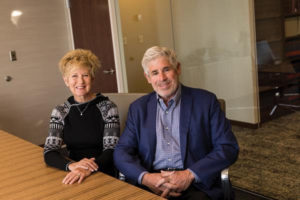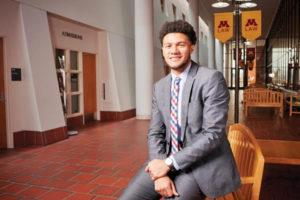Impact of Giving
For Charles Nauen ’80 and Pati Jo Pofahl ’86, involvement with the University of Minnesota Law School has been an enduring part of their lives.
The couple has remained closely connected not just to the people they met as students, but, through gifts that support the education of tomorrow’s lawyers, to the Law School’s mission itself. In 2018, Nauen and Pofahl decided to expand their giving with the creation of a scholarship that would support students from traditionally underrepresented backgrounds.
“We felt it was very important that there be more diversity in practitioners and diversity in the University of Minnesota Law School,” Nauen says. “So we decided to fund a scholarship with that in mind.”
As a Law School student, Nauen was active in international law moot court; he also represented clients in the school’s legal clinics. His first clerkship was back in his hometown of Sioux Falls, South Dakota, where he found representing clients to be what he enjoyed most about practicing law.
This discovery set the trajectory for his nearly 40-year career in litigation at Minneapolis-based Lockridge Grindal Nauen. Over the years, Nauen has specialized in environmental and business law at the federal and state levels. He has also been active in political and election law for the past decade, serving as general counsel for Minnesota’s Democratic-Farmer-Labor Party and representing many Democratic elected officials.
While she was a J.D. student, Pofahl did litigation-related research for the Minnesota Law Review. She also clerked during the summers at Lindquist & Vennum (now Ballard Spahr) in Minneapolis, where she later practiced corporate and securities law for about 10 years.
“I found my law school experience to be very fulfilling,” says Pofahl, who went on to teach English as a second language to immigrants and refugees in St. Paul. “What I learned in law school was to analyze, but also to advocate.”
Staying Connected
Both Nauen and Pofahl have kept in touch with members of their respective graduating classes. Pofahl regularly attends reunion dinners with her former classmates as well as the full class reunions. Nauen keeps in touch with his own classmates and helps organize his class’s reunions. He also knows many of the people from Pofahl’s class, as the couple married during her final year in law school.
“We stay pretty close with the U, and we have a lot of friends who were at the Law School with us or went to the U,” Nauen says. “We like to hang around lawyers.”
Another way Nauen stays connected to Minnesota Law is through sharing his expertise with today’s students. He has led an environmental law seminar for nearly 30 years— the result of a suggestion he made to expand the instruction beyond the single environmental regulation course available at the time.
“I contacted the Law School to tell them I thought they needed more environmental law offerings, because the Twin Cities was a pretty good marketplace for environmental law,” he says. “That led to them asking me to teach the class.”
Since then, the environmental law focus has grown substantially. Minnesota Law now offers a concentration called Environmental & Energy Law, which draws ample student interest. Nauen currently teaches his seminar with Lockridge Grindal Nauen partner David Zoll ’03. He and Pofahl also sponsor a student environmental writing award.
From time to time, Nauen hears how much his students are borrowing to afford law school. It reminds him of the support that both he and Pofahl received during their own enrollment at Minnesota Law. Today, their giving is one way they pay it forward and make similar opportunities available for present- day students.
This Is What Lawyers Do
Pofahl and Nauen’s support is already helping students like Develyn Ferguson, 1L, of Milwaukee. From a young age, Ferguson’s parents wanted him to be on the right side of the law. They taught him to read from legal encyclopedias, and the experience instilled in him a lasting interest in law. He initially thought he would go into law enforcement, but later realized that what he truly wanted was to practice law.
“I kept reading legal fiction, common law, and all types of legal material,” he says. “And I realized, ‘You know what? This is not what police officers do. This is what lawyers do.’”
Ferguson was excited to get underway with his degree last fall. Despite some trepidation about how difficult law school might be, he says his experience has been phenomenal so far, and that Minnesota Law has provided an atmosphere where he feels that he can learn as he grows. He plans to concentrate his studies around civil litigation and pursue a career in the field after graduation.
Ferguson says he’s grateful for the gift Nauen and Pofahl provided.
“My first semester of law school was the first time in which I didn’t feel the burden of financial disadvantage, and to have PJ and Charlie be the ones to help me out with that when I had never even met them meant a lot to me,” he says. “They have recognized the importance of diversifying the legal profession.”
Soon enough, the three did meet, and through a bit of serendipity, their connection has already grown beyond the scholarship. When Ferguson came to thank Nauen and Pofahl for their support and tour Lockridge Grindal Nauen’s Minneapolis office, it led to another opportunity for him: a summer associateship with the firm.
Linking students to professionals and sparking connections is one way to help people from underrepresented backgrounds become integrated in the Twin Cities legal community, Pofahl says.
“One of the best things about starting the scholarship is being able to meet the students, and help them establish contacts,” she says. “I would like to see the outcome be not only having more socioeconomic diversity at the Law School, but in all areas of practice.”
This article originally appeared in the Spring 2020 edition of Minnesota Law, The University of Minnesota Law School Magazine.


